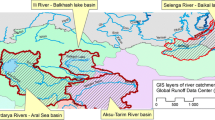
Overview
- Provides a holistic inter-disciplinary evaluation of South Africa’s deterioration of its freshwater resources
- Presents suitable recommendations to transform current freshwater predicaments into prioritized solutions
- Is an in-depth evaluation of the main factors contributing to the unceasing decline of South Africa’s water resources
Part of the book series: Water Science and Technology Library (WSTL, volume 101)
Access this book
Tax calculation will be finalised at checkout
Other ways to access
About this book
The book provides a critical evaluation of South Africa’s freshwater resources to illustrate the way in which its freshwater resources, water access, services and infrastructure have continued to decline over the past three decades. The continued decline of water governance, management, water service delivery, dilapidated water infrastructure, dysfunctional local governments and overall excessive water degradation is illustrated and emphasized using real-life examples and case studies from various contexts within the country.
The main argument of the book is that South Africa’s freshwater resources have declined to such an extent that it can be described as a predicament. Questionable water governance decisions and reactive water management practices have led to no improvement and/or increased degradation of freshwater resources. An overall lack of service delivery exists across the country, in various contexts, leading to further water and social decline.An inter-disciplinary evaluation of South Africa’s current water predicament is provided, major water crises are prioritized, and suitable recommendations are given to transform its predicament into problems which can be addressed. Suitable background information is given to emphasize the necessity of good water governance, management, and service delivery. South Africa’s freshwater resources are evaluated with specific focus on the decline of informed water governance, management, service delivery and water quality. Factors requiring urgent attention are determined and suitable recommendations and/or actions are provided.
An evaluation and overall synthesis focused on the transformation of the predicament into problems is provided. Primary water problems are prioritized according to urgency and suitable recommendations are given to assist in transforming the country’s current complex water predicament into “simpler” water problems. Political will, collaboration with researchers, stakeholders, non-governmental organizations, and cooperation of civil society is required.South Africa’s already scarce freshwater resources and decaying infrastructure will persist and possibly collapse if no major actions or interventions are implemented.
Similar content being viewed by others
Keywords
Table of contents (7 chapters)
-
Front Matter
-
Back Matter
Authors and Affiliations
About the author
Bibliographic Information
Book Title: South Africa’s Water Predicament
Book Subtitle: Freshwater’s Unceasing Decline
Authors: Anja du Plessis
Series Title: Water Science and Technology Library
DOI: https://doi.org/10.1007/978-3-031-24019-5
Publisher: Springer Cham
eBook Packages: Earth and Environmental Science, Earth and Environmental Science (R0)
Copyright Information: The Editor(s) (if applicable) and The Author(s), under exclusive license to Springer Nature Switzerland AG 2023
Hardcover ISBN: 978-3-031-24018-8Published: 14 January 2023
Softcover ISBN: 978-3-031-24021-8Published: 14 January 2024
eBook ISBN: 978-3-031-24019-5Published: 13 January 2023
Series ISSN: 0921-092X
Series E-ISSN: 1872-4663
Edition Number: 1
Number of Pages: XVIII, 177
Number of Illustrations: 13 b/w illustrations, 17 illustrations in colour
Topics: Water, general, Sustainable Development, Pollution, general, Environment, general, Environmental Policy



